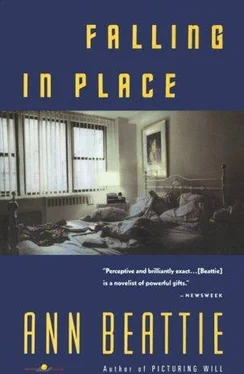Ann Beattie - Falling in Place
Здесь есть возможность читать онлайн «Ann Beattie - Falling in Place» весь текст электронной книги совершенно бесплатно (целиком полную версию без сокращений). В некоторых случаях можно слушать аудио, скачать через торрент в формате fb2 и присутствует краткое содержание. Год выпуска: 1991, Издательство: Vintage, Жанр: Современная проза, на английском языке. Описание произведения, (предисловие) а так же отзывы посетителей доступны на портале библиотеки ЛибКат.
- Название:Falling in Place
- Автор:
- Издательство:Vintage
- Жанр:
- Год:1991
- ISBN:нет данных
- Рейтинг книги:4 / 5. Голосов: 1
-
Избранное:Добавить в избранное
- Отзывы:
-
Ваша оценка:
- 80
- 1
- 2
- 3
- 4
- 5
Falling in Place: краткое содержание, описание и аннотация
Предлагаем к чтению аннотацию, описание, краткое содержание или предисловие (зависит от того, что написал сам автор книги «Falling in Place»). Если вы не нашли необходимую информацию о книге — напишите в комментариях, мы постараемся отыскать её.
Falling in Place — читать онлайн бесплатно полную книгу (весь текст) целиком
Ниже представлен текст книги, разбитый по страницам. Система сохранения места последней прочитанной страницы, позволяет с удобством читать онлайн бесплатно книгу «Falling in Place», без необходимости каждый раз заново искать на чём Вы остановились. Поставьте закладку, и сможете в любой момент перейти на страницу, на которой закончили чтение.
Интервал:
Закладка:
“What’s the matter with you? I bought you hamburgers and French fries and a milkshake, and you want an éclair out of me, and you’re not speaking to me.”
“Nothing’s the matter. You just won’t admit that you’re a coward.”
“Okay. I’m a coward. Now snap out of it.”
“Yeah. You’re saying that, but you don’t believe it.”
“Jesus,” John Joel sighed.
“I might not have a lot of friends, but you don’t either.”
“Jesus. What’s this, I’m with a five-year-old?”
“What did you talk about the cats for?”
“They never got to be cats. Your mother gave them away. They’re gone. Big fucking deal. An alley cat.”
“Tear it up. Go on,” Parker said, shoving the corner of the package against John Joel’s arm.
“You’re gonna make me mad, Parker. I’m gonna leave you here and get on the train without you.”
“I’ve got eight bucks.”
“Okay. Then pay for your own ticket. And stop hassling me.”
Parker got in line for a ticket. John Joel stood in the line opposite him and watched him out of the corner of his eye. Parker was sweating. It was hot in the station, but not that hot. Parker got this way a lot: He’d harp on something that didn’t make any sense to begin with, and he wouldn’t quit until somebody really sat on him. He was always shoved around in school. In fact, John Joel didn’t really pal around with Parker in school. It was easy to avoid Parker, because Parker was twelve, and two classes ahead of him. When Parker wasn’t around, he’d laugh with the other kids at things Parker said and did. But during the summer he saw a lot of Parker. Parker was always coming over, and nobody else called him when school was over. He called people a couple of times to see if they were home, but their parents always answered, so he couldn’t be sure. He hung up when their parents answered.
Parker got his ticket first and walked away, heading for the gate. John Joel wondered if Parker would wait for him, or if Parker expected him to find him on the train. He decided that if Parker wasn’t waiting, he wasn’t going to look for him. He didn’t care if Parker’s mother gave him a ride home from the station or not. He’d call his own mother. She didn’t like Parker, and if he told her they’d had a fight, she’d probably be glad.
Parker was waiting, just inside the gate. He was standing and watching a woman arguing with a man. The man was in his early twenties and he had a magazine that he was trying to give the woman, and she was objecting. She tried to involve one of the conductors in the discussion, but he walked past the two of them as if they weren’t there. A lot of people began to come through the gate; a few looked at the two people quarreling, but nobody but Parker actually stood and watched. John Joel tried to get his attention so he’d move — they always kept the doors on the damn train closed until you’d walked half the length of it, and John Joel wanted to get on the train, where it might be cool. He sighed and stared at Parker.
In another few seconds the man walked off, and the woman stood there, talking to herself. “It was a wig,” she kept saying.
John Joel gestured for Parker to come on. Parker paid no attention, and John Joel decided to give him ten more seconds and then start walking. Parker was crazy if he thought the woman wasn’t going to turn on him and start giving him a rough time if he continued to stand there. Parker was always getting involved in situations where he’d put his face in the middle of something. It was happening now; the woman, slowly realizing that Parker was there, was turning toward him, complaining. Parker listened, a silly smirk on his face. Then, after a few sentences, he interrupted the woman, and John Joel was amazed to hear him asking her if she believed in the Kingdom of Heaven. “The real Kingdom of Heaven,” she said to Parker loudly. “Not some man in a wig. That magazine wasn’t really about Heaven.” And then John Joel watched as Parker said something he couldn’t understand. The woman didn’t get it, either; she leaned forward and cocked her head. She stopped talking. Parker was doing all the talking. He was holding out the picture to her, still in its wrapping, telling her that the other man was just testing her, and that she had passed the test. Her reward was a picture of herself in the Afterlife. The woman began swaying as he talked to her. “Who are you?” John Joel heard the woman say. She began to back away from Parker. The crowds were thinning out. They were going to miss the train. He decided to give him five more seconds, and then walk away. Parker was getting into another one of his crazy routines, and what he was doing was sure not to make any sense. He stared, along with the woman, as Parker fanned his shirt away from his body with one hand, then pushed the package toward her. “You might as well see it,” Parker said. “This is who you’re going to be.” The woman reached out for the package just as John Joel turned and began to walk quickly toward the train. There wasn’t going to be a seat, just because Parker was so crazy, just because he was always kidding around. He turned to see Parker running behind him and the woman ripping open the package. A man with a beer can in his hand and a briefcase in his armpit rushed past her, past John Joel and Parker, mumbling to himself.
“Now what are you going to tell your mother?” John Joel said.
“I gave it away, didn’t I?” Parker said. “Didn’t I tell you?”
John Joel sat down in the first seat he saw. He didn’t care if Parker stood all the way. But when he turned around he saw that Parker had found a seat not far behind him. John Joel had been right about feeling Parker staring at the back of his head. Okay: So Parker had given away the picture, if that meant so much to him. He wondered why he felt guilty himself; he wondered if the right thing to do wasn’t to get off the train and run back and try to get the picture, if the crazy woman was still there. The doors closed and the train started to move out of the station. They hadn’t bought éclairs, and he was hungry. He had the nervous feeling in his stomach that meant he ought to eat something soon. He decided he’d get some peanuts from the bar car. Walking down the aisle past Parker, he was surprised to see that Parker had his bandanna out, and was rubbing his eyes. Parker was crying. Sitting on the train, crying. John Joel kept walking, and pretended not to know him.

When they got off the train, John Joel waited on the platform for Parker. He half thought that Parker wouldn’t get off, but he did. His eyes weren’t red and the bandanna was back in his pocket. Parker had gotten so sweaty that his shirt clung to him in rivulets of wrinkles. Parker shook his head to the side, and if his hair hadn’t been so damp, it would have fallen across his forehead the way Parker liked it to. He gave up and smoothed it straight back, and as he walked, he took a cigarette out of the package and put it in his mouth. He did his trick of lighting a match by bending one forward, closing the book, and striking it with his thumb. He held the match to the cigarette and shook the flame out .
“I’m walking,” Parker said .
“Walking? All the way home? You’d never be able to walk all the way home.”
“She won’t do shit to me,” Parker said. “She knows I’d tell the shrink. She’s gonna be half-crocked by the time I get home anyway.”
“Come on, Parker. Call”
“I’m not going to New York with you anymore,” Parker said .
Читать дальшеИнтервал:
Закладка:
Похожие книги на «Falling in Place»
Представляем Вашему вниманию похожие книги на «Falling in Place» списком для выбора. Мы отобрали схожую по названию и смыслу литературу в надежде предоставить читателям больше вариантов отыскать новые, интересные, ещё непрочитанные произведения.
Обсуждение, отзывы о книге «Falling in Place» и просто собственные мнения читателей. Оставьте ваши комментарии, напишите, что Вы думаете о произведении, его смысле или главных героях. Укажите что конкретно понравилось, а что нет, и почему Вы так считаете.












